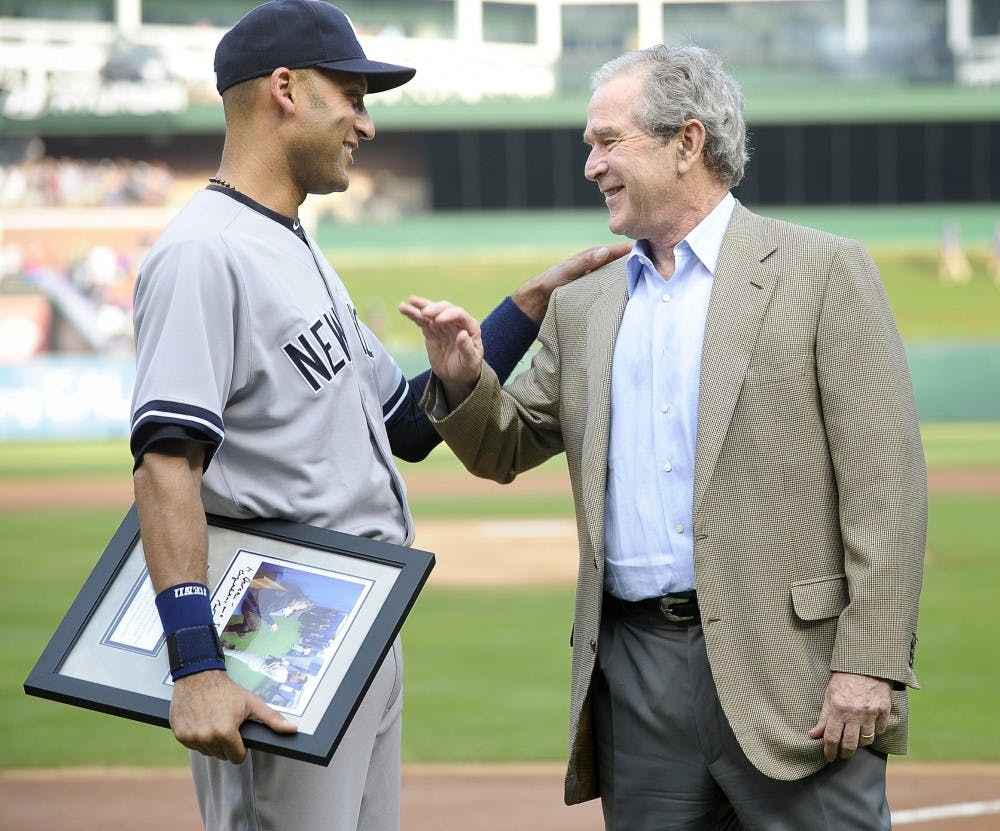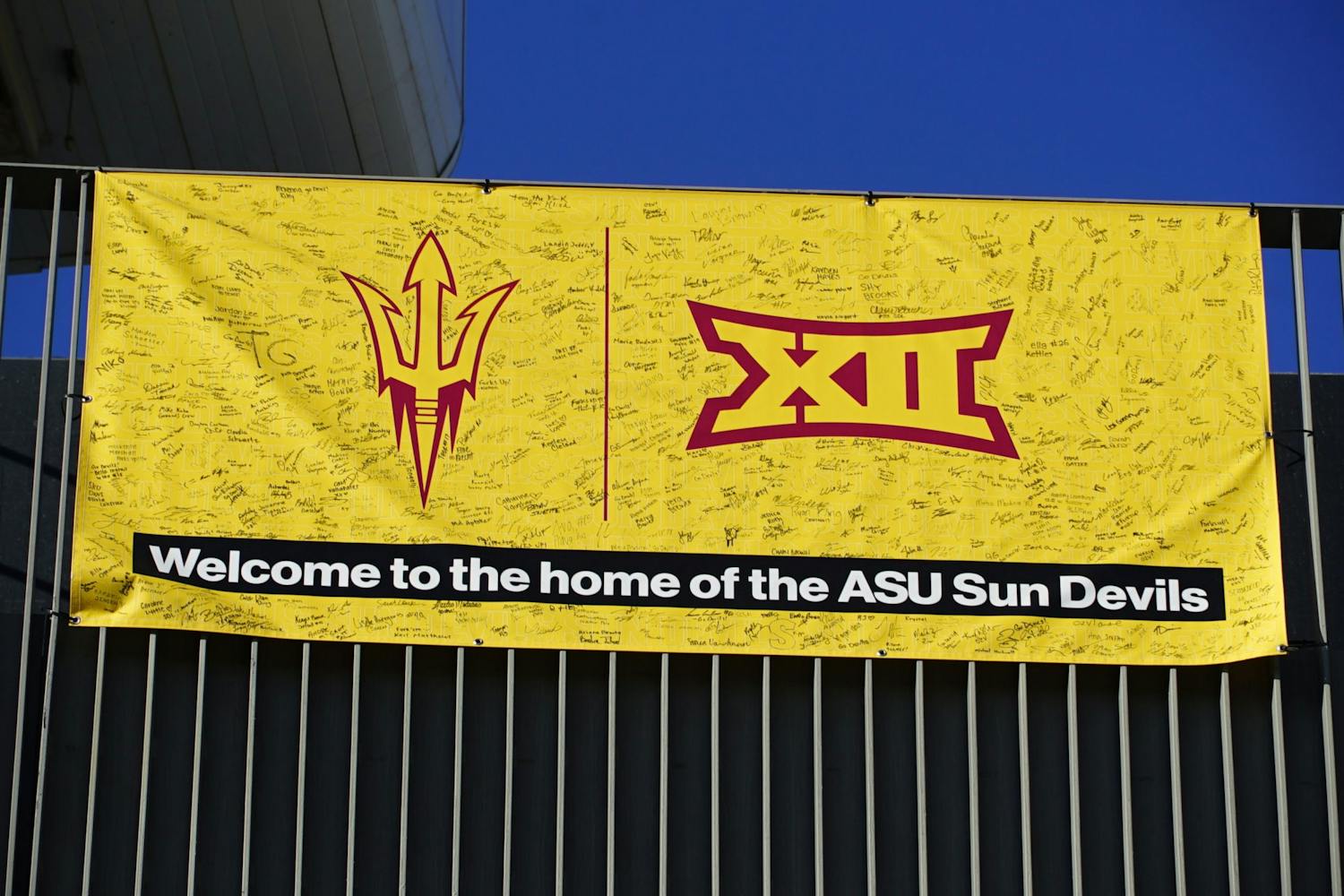In remembrance of the tragedy of Sept. 11, 2001, SPM contributor Stefan Modrich reflects on a time that galvanized American patriotism. It was a moment that briefly united an entire city, and eventually a country, with a feeling of optimism and hope in complete darkness. Along with Derek Jeter’s impending retirement, his central role in the narrative of the post-9/11 baseball scene is recalled, as well as his relationship with former President George W. Bush.
 A 9/11 commemorative logo is visible on the field as the Texas Rangers beat the Oakland Athletics 8-1, eliminating the A's from the playoffs, Sunday, September 11, 2011 in Arlington, Texas. (Richard W. Rodriguez/Fort Worth Star-Telegram/MCT)
A 9/11 commemorative logo is visible on the field as the Texas Rangers beat the Oakland Athletics 8-1, eliminating the A's from the playoffs, Sunday, September 11, 2011 in Arlington, Texas. (Richard W. Rodriguez/Fort Worth Star-Telegram/MCT)It was a celebration unlike anyone in the Valley had ever seen at Bank One Ballpark in downtown Phoenix on a brisk November night.
The Arizona Diamondbacks had just defeated the New York Yankees in a seven-game series, when Luis Gonzalez hit a single off of the greatest closer of all-time, the mighty Mariano Rivera — scoring Jay Bell from third base and completing the World Series in dramatic fashion with a 3-2 win.
This game would go down in history as one of the greatest World Series finishes of all-time. But the one that meant the most both on and off the field happened earlier the series, and it remains a treasured instant in time. It is a story told in visual form, and among family, in sports bars and barbershops, for New Yorkers and Americans across the country.
September in America is a time of winding down as the summer comes to a close. But for baseball, America’s national pastime, the action is ascending to an epic climax, to be completed in the chill of October and November.
Pennant races intensify for the teams at the top of the standings as they vie for home field advantage, and battles are fought between teams in the middle of the pack trying to eke out a playoff spot.
On a bright Tuesday morning, America was merely going about its business, when at 8:46 a.m. a plane struck the North Tower of the World Trade Center. It was the first of four planes to be hijacked and crashed on the East coast that day.
The Chicago White Sox were scheduled to play the New York Yankees in the Bronx that night, and the New York Mets were in Pittsburg to play the Pirates. But across the country, Major League Baseball came to a halt in wake of the terrorist attacks.
“In the interest of security and out of a sense of deep mourning for the national tragedy that has occurred today, all Major League Baseball games for today have been canceled,” Commissioner Allan H. Selig said. “I will continue to monitor the situation on a daily basis and make ongoing decisions accordingly.”
On October 30th, 2001, more than a month later, the Arizona Diamondbacks were in New York to play game three of the World Series. Tensions were high due to the presence of metal detectors, and police officers carrying automatic weapons. But there was a reason for the heightened security besides the obvious threat of another terrorist attack. A special guest was to join the two clubs to throw out the first pitch.
 Former President George W. Bush presents New York Yankees shortstop Derek Jeter with signed photo before the Rangers take on the Yankees at Globe Life Park in Arlington on Wednesday, July 30, 2014, in Arlington, Texas. Jeter is retiring at the end of the season. (Max Faulkner/Fort Worth Star-Telegram/MCT)
Former President George W. Bush presents New York Yankees shortstop Derek Jeter with signed photo before the Rangers take on the Yankees at Globe Life Park in Arlington on Wednesday, July 30, 2014, in Arlington, Texas. Jeter is retiring at the end of the season. (Max Faulkner/Fort Worth Star-Telegram/MCT)Former President George W. Bush ducked into the home locker room of Yankee Stadium and briefly met with the umpiring crew and then with Yankee captain, and starting shortstop, Derek Jeter.
“If I was going to throw out the ball, I wanted to do so with a little zip,” Bush said in a media interview later that day. “I didn’t want the American people to think that their president was incapable of finding the plate.”
The 43rd president went on to explain how his conversation with Jeter shaped one of the most memorable moments in American history.
Jeter asked Bush; “I hear you’re throwing the first pitch, where are you going to throw it from?”
Bush told him he had been planning to throw from the base of the mound.
“I wouldn’t do that if I were you, Mr. President,” Jeter said. “This is Yankee Stadium, if you do that, they’ll boo you. Oh, and don’t bounce it in either, they’ll boo you.”
Just minutes before game time, an announcement rang out over the nervous crowd of 55,820 in attendance.
“Ladies and gentlemen, the 43rd President of the United States!”
Cheers of “U-S-A!” rang throughout the ballpark.
President Bush walked up the steps of the dugout and out to the pitcher’s mound, waving to the crowd as he stepped over the foul line on the first-base side.
The president paused for a moment, taking in the energy of the crowd, as fans of both teams were united in feelings of deep patriotism and pride.
He wound up and threw a strike to the glove of Yankees backup catcher Todd Greene. The crowd roared in approval.
In a brief, surreal moment, the terrors that had befallen our country just a month prior had disappeared. The partisan bickering and separation that normally plagues our nation vanished into thin air with the sound of the leather rawhide sphere held together with 108 intricate red stitches — a five-ounce white ball stamped with blue ink, landing in a large leather glove.
The game itself was a memorable one, especially for Yankees fans, as the team pulled out a 2-1 win, anchored by the pitching of Roger Clemens. Scott Brosius drove in the winning run in the sixth inning, and Mariano Rivera closed the deal in the ninth.
Baseball in its purest form was what America desperately needed, and the element that former President Bush brought by throwing out the first pitch strengthened this notion even more.
Shaken, knocked down, battered, broken, but never defeated, our resilient firefighters, police officers, and men and women of the Armed Forces lifted the weary souls of those who had lost loved ones and dear friends. They fought to defend the very liberties we continue to enjoy and take for granted.
While many questioned the President after his tenure in office had ended, even his greatest political enemies could not deny the power of his pitch and how it brought together the country, and the special place it holds in the hearts of those affected by the tragedies of September 11, 2001.
There was no political agenda, no messages of self-promotion, just a humbling recognition that the President had one job that night, and it was to throw a strike.
Reach the reporter at smodrich@asu.edu or follow him on Twitter @StefanJModrich




